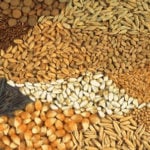From Akoko to Yewal, Ogbomoso to Badagry, Ilesa to Omuo Ekiti, it is tale after tale of the frustrating consequences of non-availability of public water, with many resorting to self-help to solve the problem, report BOLA BADMUS, OLAYINKA OLUKOYA, OLUWOLE IGE, TUNDE OGUNESAN, HAKEEM GBADAMOSI and YOMI AYELESO.
“Government water? Public tap? I’ve never heard or seen anything like that all my life in this area” was the response of a resident in one of the local government areas in Ekiti State, who simply identified himself as Matthew.
Water is a necessity in everyday life and its usefulness cannot be overemphasized. However, for the people of the six states in the South-West, access to potable water has been a difficult task to achieve by various successive governments.
As the people struggle to fill the gap created by non-availability of water, successive governments have either allocated or claimed to have spent huge sums of money on water projects with little or nothing to show for their interventions.
Investigations by Nigerian Tribune across the six states show that the people have similar stories to tell about how public water supply has become a mirage and all hope lost in that direction.
Despite N48.7 billion project, Ilesa, Ikirun yet to get water
In Osun State, despite huge investments by both the Federal Government and the Osun State government in water projects, findings indicate that most of the public taps are dry, as majority of the people in various communities often besiege wells to fetch water, and in some instances purchase water from the operators of commercial boreholes. There is also the case of some landlords who constructed boreholes outside their compounds for residents in the neighbourhoods.
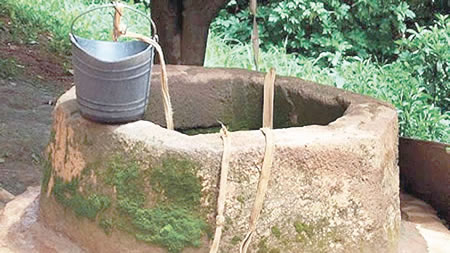
From Osogbo, the state capital to Ilesa, Ikirun and other major cities, it has been tales of woes on the struggle of the citizenry to get access to drinkable water. For instance, Ilesa town had been without potable water for 40 years, a development that compelled the Federal Government to inaugurate the N48.7 billion Ilesa waterworks project on December 18, 2017. The project, which was scheduled to be completed in December 2019, is still ongoing and the completion date has been extended to December 2020.
Former Special Adviser on Water Resources to the immediate past governor of Osun State, Mr Rauf Aregbesola, Mrs Tawakalitu Williams, who appeared before the Osun State House of Assembly last year over the Ilesa waterworks project, attributed the delay in the completion of the project to lack of funds and logistics challenges. Williams, who is the consultant to the Osun State government on the project, said when completed, the waterworks would produce 60 million litres of water daily to the Ijesa communities.
It’s no longer viable to provide water free of charge —Osun govt
When contacted, the Commissioner for Water Resources, Dr Amidu Tadese Raheem, said: “For water to be available on a sustainable basis, government alone cannot provide everything. Water consumers, just like electricity, even though it is being provided by government, is not free of charge. Now, there’s need for consumers to pay for water services. You should understand that when public taps were in existence, nobody paid for it. It was then being funded by government. But, the state government has realised that such action is no longer viable.”
The last time we enjoyed public water supply was during military era —Ondo resident
The Owena multipurpose dam project in Igbara-Oke in Ifedore Local Government Area of Ondo State, which is expected to supply water to the six local government areas in the central senatorial district of the state was started by the Olusegun Agagu administration, but has been abandoned by successive governments in the state.
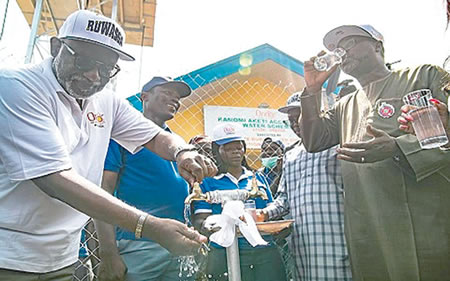
The Federal Government embarked on the rehabilitation of the water dam in 2008 to provide drinkable water for the people of the state, but despite spending billions on the project, it has failed to see the light of day.
Many residents of Akure, the state capital, bemoan scarcity of water, especially during the present dry season, saying most wells and boreholes have dried up.
One of the residents, Michael Adedayo, said the last time water was supplied to homes in the state capital was during the military era.
“We have been hearing of government spending billions of naira on water project with no results. In this community, we decided to sink a borehole to provide water for ourselves, but it is always war during the dry season. We are planning to sink two or three boreholes to serve us better. Water supply is no longer a duty of government; they have turned water projects into tunnels for siphoning money,” Adedayo added.
A resident of Oba Ile in Akure North LGA, Mrs. Bola Johnson, expressed disappointment over the inability of government to provide water, saying individuals resorted to sinking boreholes or digging wells as their sources of water supply, while they buy water during dry seasons.
A visit to the water corporation in Alagbaka area of the state capital to find out why water supply to most homes in the state has become a mirage was revealing. An official of the corporation who spoke on the condition of anonymity disclosed that “an ongoing one is the Owena multipurpose dam with the credit support from French Development Agency (AFD) to the tune of $57 million to cover the improvement of 50 per cent water supply to the southern part of Akure city and the ongoing discussion with the African Development Bank (AfDB) for the additional loan of $10million to cover the remaining 50 per cent and the adjoining satellite towns.
“Only the soft components which include the training of personnel and procurement have started. The core hard components like the engineering works on site/movement to site will commence by the end of 2020. We are told that test running of water supply can’t be earlier than 2023,” he said.
Interestingly, for residents of Ayede Ogbese in Akure North Local Government Area it’s been commendations for the state government in the area of water scheme in the area, as the present administration embarked on the project following a devastating revelation that the percentage of public water supply in the state was less than four percent. Residents of Ogbese community stated that they have been enjoying regular supply of water to their homes with the Kamomi Aketi Water Scheme.
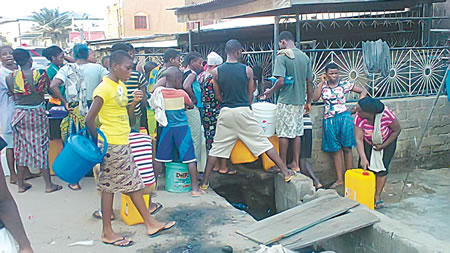
A government official however said the scheme was part of the state government’s efforts aimed at meeting the Sustainable Development Goal (SDG) 6 by 2030 and the water scheme was executed by the Ondo State Rural Water Supply and Sanitation (RUWASSA) to provide potable water for the people of Ayede Ogbese and its environs.
In the coastal areas of the state where people who live on water cannot boast of potable drinking water and have to walk for miles to get drinking water, the N4 billion water project initiated by the immediate past administration in the state in Aboto has been described as waste by the people of the area.
The state chairman of the Senior Staff Association of Statutory Corporation and Government owned Companies (SSASCGOC), Mr. Ola Amure, has raised the alarm over imminent water scarcity in the state, calling on the state government and commissioner in charge to make efforts to address the situation.
In Ado-Ekiti, Orin, Ikere, water is gold
In Ekiti State, provision of pipe-borne water to the people has always been a priority of successive administrations since the creation of the state in 1996. However, in spite of the huge annual budgetary provisions by past administrations, not much was achieved in this regard.
Nigerian Tribune observed that many residents in Ado-Ekiti, the state capital, depend largely on water from open wells, while the privileged few patronise water vendors and sachet water merchants.
The situation usually, gets worse during the dry season, when residents move around with jerrycans, scooping water from few available water points provided by religious houses, petrol stations, banks, houses of prominent individuals and others offering social responsibility to their host communities.
In Orin-Ekiti, Ido/Osi LGA, people in the community have little or no access to potable water. A few of the wells dug in the community cannot be seen to be hygienic for people’s health.
A leader of the community and the Eletin of Orin-Ekiti, Chief Francis Falua, confirmed to Nigerian Tribune that the community has no access to pipe-borne water.
“Our people are lament everyday. We have been calling on government to help construct boreholes for us here. You should know that this well we are currently using cannot be said to be good for our health and it is obvious. We don’t have any other option and that is why we use it and also go to the stream,” he said.
In Ikere-Ekiti, it was observed that a few boreholes in the community were not enough to cater to the huge population in the area. A resident of the community, who identified himself as Gbenga Adeloye noted that individuals have helped provide pipe-borne water.
According to Adeloye, the Speaker of the Ekiti State House of Assembly, Funminiyi Afuye, sank a few boreholes for the community, but said more were still needed.
He said: “We have a few boreholes here in Ikere-Ekiti. Truth be told, some are not working at the moment, while the few that are working cannot solve our needs. The fear I have is that the water we are using now cannot stand the test – health-wise – and that is why our government must come to our rescue.”
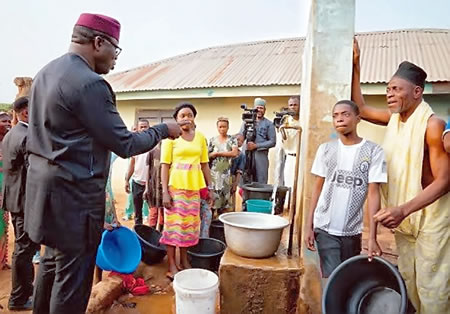
Ekiti takes delivery of N1.4 billion equipment for rehabilitation of Ero dam
In its effort to address the situation, the administration of Dr Kayode Fayemi had approached the World Bank for rehabilitation of various dams in the state. Two weeks ago, the governor took delivery of water equipment worth N1.4 billion for the ongoing rehabilitation work at Ero dam, a project which the governor said would provide potable water for 10 LGAs of the state.
According to him, “There are a lot of things that we are doing that we have to stay on top of monitoring for it to be delivered on time and on cost. I spoke about the rehabilitation of our dams, among other things – Ero dam, Egbe dam, Ureje waterworks in Ado Ekiti. I did mention that we are expecting that these dams’ rehabilitation will be done, water will be flowing in most of our communities, and the pipe works will be completed, all in year 2020. By June this year, we expect this to have been completed.
“The last batch of equipment that we are expecting for this to become a reality has come in. These are the high-lift water pumps and the low lift water pumps for Ero dam and that is what I came to inspect to ensure that once they are here, they came as inspected because we sent a team to India to inspect these and ensure that they are in compliance with the specifications given.
“This dam serves 10 local government. It is a million cubic litres on a daily basis when running in full capacity. Egbe dam covers the other six local governments area and the Akoko parts of Ondo State. That’s also being completed. The high-lift pumps have also arrived and they are coupling it together to ensure they are working.”
Even with 100 waterworks, many Ogun communities lack access to potable water
Parts of Ogun State over the years have had no access to water from the state water corporation despite having more than 100 waterworks.
In Abeokuta, the state capital, water supply has been a major challenge which has forced people to buy water for domestic and other sundry uses from homes with boreholes, while many fetch water from unclean and doubtful sources due to non-supply from the state water corporation.
Following massive road construction works embarked on by the state government within the Abeokuta metropolis under the last administration, big pipes carrying water to homes were cut off. As such, water has not been supplied to homes in the last eight months. Also, the rocky state of Abeokuta has not been favourable to the digging of wells or boreholes to get water.
At Abule Otun, a suburb of Lafenwa in Abeokuta North LGA, scarcity of pipe-borne water is acute, with the entire community being served by just one borehole. Majority of people living in the community depend on water from wells. Only a few houses have functional wells. Moreso, these wells usually dry up during the harmattan season. This forces the entire community to overdepend on the only borehole in the area. Even the borehole is being run as a commercial entity with water being sold at N20 per jerrycan. To purchase members of the community line up to fetch water from this borehole very early in the mornings and in the evenings.
Residents including men, women and children in the community usually abandon other duties in search of water on a daily basis. This also goes for residents of Amolaso, Kuto, Oke-Yeke, Arinrelese, Iyana Mortuary, Oke-Itoku, Ijaiye, Oke-Ilewo, Onikolobo, Sapon, all in Abeokuta, as well as for people living in Ogun West and East senatorial districts of the state.

Meanwhile, the Ogun State governor, Prince Dapo Abiodun, during an inspection of Abeokuta main water scheme at Arakanga recently, assured the people of his administration’s readiness to address the problem of acute shortage of water in the state. He inspected two waterworks to access the situation as it affects the state water corporation. Abiodun equally attributed the current water situation in the state to lack of commitment on the part of previous administrations in the state.
“What we have seen here is that there were no deliberate efforts by previous administrations to invest appropriately to ensure regular water supply. The people working here have only resorted to self-help. The equipment is obsolete; no maintenance policy that is consistent with the 21st-century water distribution. As we speak, there is no electricity supply at the station. There is no water that can be treated,” he noted.
We have never come across public water in our areas —Lagos residents
For many Lagos residents, there is heavy reliance on private boreholes in homes, while some others make use of wells, depending on financial capabilities. In some other cases, people have to depend on buying water from tanker drivers, while others buy theirs from those hawk jerrycans of water.
Mr. Sina Adesola who lives in Isheri-Idimu area of Lagos, said he was yet to come across public tap water in the area where he had lived for some years now.
“I know what public water is. I am telling you that I have never come across it in that area since I moved to the area about five years ago; not at all. In our area, in Isheri-Idimu, we rely mainly on boreholes,” he said.
Another resident, Madam Adesola, who lives in Bameke-Shasa in Alimosho LGA, said public tap water is what she was yet to come across in the area.
“I have been in the area since 2012 and never have I come across any public tap water in the area. Not once. In our house, we rely on boreholes, and it is the same thing also in all other houses in the area,” she said.
Another resident who identified himself as Mr. Gani, said no tap water is currently flowing in Oshodi area, recalling that the promises made by the government on provision of public water areyet to be met.
Perhaps the Lagos State government is not oblivious of the problem on the ground concerning lack of adequate water supply in the state. Only last December, the state government said it had signed a cheque for N600 million to compensate property owners on the Adiyan waterworks project axis. The project being embarked upon by the state government is aimed at reviving the N50.2bn Adiyan waterworks.
The Commissioner for Information and Strategy, Mr. Gbenga Omotoso, made this known in Ikeja at a media parley to commemorate the 200 days in office of Governor Babajide Sanwo-Olu, stating that this was aimed at resuscitating the phase 2 of Adiyan waterworks.
“We are doing this project in collaboration with Ogun State government. Very soon, work will commence on the project. By mobilising the contractors back to the site, hope has risen for better provision of safe drinking water to more than five million Lagos residents. The project will help to address sanitation challenges and fight water-borne diseases,” he said.
‘In Oyo State, the public taps we grew to know are fast disappearing’
In Oyo State, most residents do not believe that public pipe-borne water is still running in the state. Surprisingly, before the popularisation of the millennium development goals, public pipe-borne water was the major source of water supply in Oyo State. Notably, public tap water spots were visible in major cities across the old Oyo State.
When successive administrations, observed that the major dams servicing these water outlets across the state then were getting overstretched, they came up with bigger and alternative dams, which gave birth to the Asejire dam and others which are now in present day Osun State.
Speaking on the water situation in the state, Mrs Ronke Olatunbosun who was born and raised in Ibadan, the Oyo State capital, said: “I remember that when I was schooling in Ibadan we lived in a rented apartment where we accessed public taps for domestic use. Then, we moved to another one which was connected to public water system and water was gradually becoming scarce. However, since we moved out of that house which is situated in the heart of the city, I have not experienced such again. The public taps we grew to know are fast disappearing.”
On his part, Alhaji Tajudeen Ismail said it would take the state government a lot to bring back public water system to life.
His words: “Apart from the fact that new areas which have sprung up in our cities were not and are not likely connected to the old water lines, the initial areas in cities that enjoyed these facilities then had been cut off totally.
“Go to major towns in the state and you will see the replicas of pipes, notably ceramic ones, to show to you the age of their installations. They seem to be permanently disconnected from these water joints on the major streets. That is why it is extremely difficult to see homes in this state which still rely on public water to use domestically.”
To corroborate claims by members of the public, a number of government buildings do not also run on public water. Most of the buildings rely heavily on boreholes as source of water. In fact, a visit to the Water Corporation of Oyo State headquarters at the state secretariat showed that the three-storey building, which also houses other government agencies, runs on alternative water supply. Big black plastic tanks were conspicuously placed at strategic locations around the building to store water for usage.
It is hoped that efforts more drastic and result-oriented towards providing potable will be made to provide water for residents in the South West.


